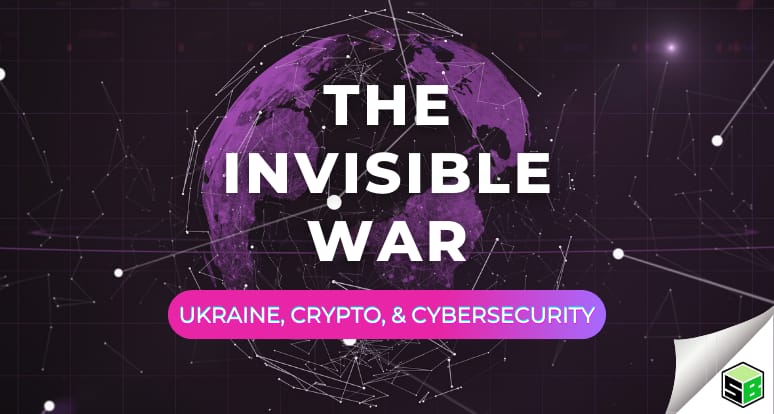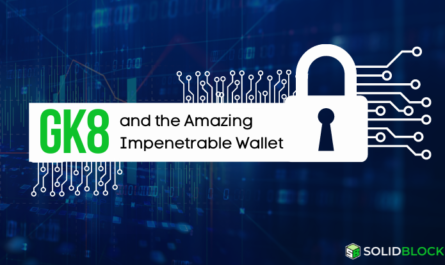
“There have been a lot of cyber attacks in Ukraine from critical infrastructure to military and social infrastructure,” explains David Carvalho, cybersecurity expert, and CEO of Naoris Protocols. “I believe the pieces of malware and logic worms were actually put in these systems years ago and were waiting to be triggered.”
Beyond the devastation wrought by indiscriminate shelling of Russian forces in Ukrainian cities like Mariupol and Kharkiv, there is another layer of fighting that we cannot see: cyber attacks and cryptocurrency transfers, and the inaccessible savings of millions of penniless refugees.
“It takes a lot of time for a hacker to follow the kill chain, as we call it, and take over all devices that access [their target]—their backups, their cloud systems,” David told us in a recent episode of the BlockSolid podcast. “What they want in this case, it’s not ransom. What they want is destruction.”
What began as posturing between the world’s superpowers as first the US, Ukraine, and then Russia ramped up their crypto policies, has become a proving ground for the advent of a decentralized financial system (DeFi).
DeFi is an umbrella term to suggest the ecosystem that has been created by the use of blockchain to move data and cryptocurrencies instantaneously and transparently. These peer-to-peer transactions cut out intermediaries such as brokerages, exchanges, and banks. They cross borders, democratize investments, and provide individuals with financial connectivity wherever they are.
Last month, Russia moved forward with legislation to legalize and regulate crypto, while Ukraine also legalized crypto. The Biden administration referred to crypto as a matter of national security, and on March 9, US President Joe Biden signed an executive order that describes what government agencies, including the Treasury Department, should do to create policies and regulations on digital currencies. It’s also expected to develop policies to enable the US government to work with foreign powers to regulate crypto and its trade across international borders.
Bitcoin and other cryptocurrencies have fluctuated wildly during the events of the past few weeks.
As a way to support Ukrainian fighters, the Ukrainian government and an NGO providing support to the military have raised $63.8 million, through more than 120,000 crypto asset donations since the start of the Russian invasion, reports Elliptic, a crypto compliance company. This includes a $5.8 million donation by Polkadot founder Gavin Wood and a CryptoPunk NFT worth over $200,000.
Russia, too, is scrambling to use the almost untraceable transactions associated with cryptocurrencies to bolster its finances in the wake of world sanctions. This has engendered a call for more regulatory oversight on the way transactions are conducted.
Meanwhile, a coalition of private and public organizations backed by the US government, according to The Financial Times, began work months ago to bolster Ukraine’s cyber security. Unfortunately, Ukrainian institutions are still vulnerable to physical and cyber attacks. Even centralized institutions such as a gas distribution center, can benefit from decentralized protocols, says David.
“Ninety percent of hacks actually happened from simple things and then there is a cascading effect that leads to a great disaster. It could be just policy not being enforced because you don’t have enough people checking on that, or you don’t even have a policy. Or there’s an employee that left [the company] and still has access.
“And you know, this is not just about Ukraine. I could be talking about the US or Europe. It is a global problem. The security enforcement that exists within companies is incredibly light and flexible to the point that makes the whole approach [to security] useless.”
Naoris has created a dedicated blockchain and consensus mechanism that has the objective of changing how cybersecurity is thought about and delivered in complex environments. It includes a cybersecurity enforcement protocol employing a HyperStructure ethos that’s unstoppable, permissionless, and credibly neutral. Every device becomes a cyber-trusted validator node, making networks safer as they grow, not weaker.
Wars are fought over resources, and this war is no different. As we watch the physical devastation in Ukraine unfold, we find ourselves asking certain questions.
- How does adopting a crypto standard change the power dynamic between nations?
- Will blockchain fuel a new system of trust to create a more prosperous future for everyone?
- Will digital resources prove themselves to be secure and immutable?
- What lessons can we draw from watching this war play out?
Your guess is as good as ours. Write to us and let us know what you think.
Download The Digital Asset Handbook

 by
by 

